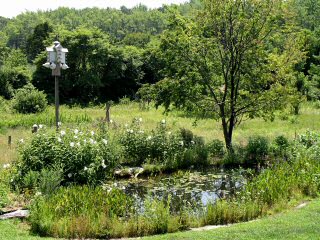|
Trail Guides
|
New Jersey Audubon - Cape May Bird Observatory Center for Research and Education
|
4
 
|
600 Route 47 North, Cape May Court House, NJ 08210
Phone: (609) 861-0700
www.njaudubon.org/SectionCapeMayBirdObservatory/CMBOHome.aspx
New Jersey Audubon
Return to Route 47 via Jake’s Landing Rd. Turn Right onto Route 47 South. Travel south on Route 47 4.2 miles, through
three traffic lights. The Center for Research and Education is one mile beyond the third light on the Left side of Route 47, near mile-marker 15. Map
 |
| From Spring to late Fall, the CMBO pond is a hotspot for wildlife viewing. | Gina Ewald |
| |
| | The Center for Research and Education serves as New Jersey Audubon’s southern home base, providing offices for much of the research department and members of the education and conservation staffs. The center's grounds host native vegitation, a dragonfly pond, a bird feeding station, a short handicap accessible trail and a variety of bird life all year. Inside, you’ll find restrooms, a drinking fountain and a store featuring a large variety of binoculars and spotting scopes, bird feeders and houses, books, videos and DVD’s on wildlife viewing, plant identification and gardening. Tell the experienced staff about your sightings and list them on the sign-in sheets in the back of the store. Your sightings are valuable to maintaining a record of species seen in the area, and are helpful to those who visit after you.
picking up a copy of The Kestrel Express, Cape May Bird Observatory’s newsletter that lists all guided walks and educational
seminars. There’s something happening in Cape May County nearly every day in spring and fall.
Birds flock to the Center’s numerous feeders including American Goldfinch, a variety of sparrows and Red-winged Blackbird. Look out over the grounds and marsh for wintering raptors and Bald Eagle.
The garden begins to green up and
flowers start to bloom. Tree Swallow are
abundant in the backyard habitat garden making new nests, and an occasional Orchard Oriole can be seen feeding in the trumpet creeper. Look up to catch the flocks of ibis flying overhead.
Butterflies and dragonflies flit around the garden. Check the pond for close up looks at the resident muskrat and southern leopard frogs. Ruby-throated Hummingbirds are active in
numbers at the feeders.
Raptor migration is at its peak as hundreds fly overhead. Migrating warblers may be found
in the nearby trees as they stop on their
journey south.
|
|
|